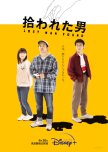
Hirowa Reta Otoko
11 oamenii au considerat această recenzie utilă
Great Acting, Great Writing
Don't let wild rumors about this being a propaganda to discourage you from watching. Otherwise you will miss such a good drama with great writing, presented by a great acting.Hirowareta Otoko is a slice-of-life, semi-fictional biography drama about Matsuo Satoru, the actor we see all over Jdramas but we don't bother to remember his name...LoL. In this drama we got to see his journey of becoming an actor as well as his psychological complex during childhood that later contributed to his sour relationship with his family members.
I don't know how good the original source material is, but the writing in this drama was presented in such an interesting way with many beautiful and smart dialogues. I liked how the writer used time jump and flashback effectively in the story telling without making viewers feel lost of the plot. The first half of the drama was full of comedy and coming of age naivety but be prepared for a more serious emotional ride in the second half if you ever choose to watch this.
The performance of the cast was another key factor that made this drama great. Nagano Taiga did an extraordinary job at portraying Matsuo Satoru in my opinion. We could clearly see that he gained few Kg of weight ahead of playing this role. He was versatile enough to easily changed from quirky to serious. As a main character he knows how to attract audiences sympathy.
Kusanagi Tsuyoshi, while doesn't get that many screen time really did well in conveying complex emotion of his mysterious character. He could have done better with his English conversation, but that's minor downside and we understand the difficulty of Japanese actors with foreign languages. I only wish they wrote a sentence that sounds more natural for a non-native speaker instead of "Cool American English" that can't be delivered (or understood).
Other actors also did well in carrying the whole drama and supporting the main character including the US cast. I would say the casting department really did a good job in this one If you're wondering about Ito Sairi, she did well too but her character was more of a supporting one than a main role (as oppose to what is stated in this MDL page).
All in all, Hirowareta Otoko was a wholesome drama that has the right amount of everything; laughter, anger, curiosity, sympathy, and sadness. It's about chasing happiness and self discovery with strong elements of family bonding and brotherhood as well as accepting one's fate whether it's good or bad. If you're looking for a slice of life drama with warm characters this is a must watch!!
About US propaganda mentioned by other reviewer.
-----------------------------------------------------------------
The following section may contain some spoilers
-----------------------------------------------------------------
Since this is a Jap-US joint production, there was an "American Arc" that's focusing on MC's stranded brother (Takeshi). Few US actors were added in the arc and it changed the feel of the drama a bit. I mean from Japan-mode to Western-mode overnight....yeah that kind of feeling. This could be a letdown for many viewers apart from the allegedly US propaganda thing that I will explain below.
However this arc wasn't as bad and still carrying important plot elements as MC got to learn the different side of his brother he didn't know before. He also got to solve the mystery surrounding his family for 15 years. The story of the kid (Sean) was also interesting and cute. It has more Japanese vibe than the western in my opinion.
And I DO NOT see Takeshi mentioning US as a peace place for diverse people as a PROPAGANDA. In fact it's an outdated concept of American Dream that's known by everyone already. Whether that dream is reality or just a dream is a subjective matter.
That statement by Takeshi was clearly his personal view and curiosity considering he was frustrated with their conservative Dad. Knowing that, Satoru candidly said "yeah you've found the place you're looking for". This could only be true in these brothers situation and does not apply to everyone. ...obviously!!
Considerați utilă această recenzie?
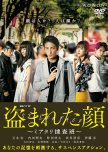
Nusumareta Kao: Miatari Sosahan
8 oamenii au considerat această recenzie utilă
The director of this drama used a lot of actors expressions and camera works for telling the story and did not rely so much on the dialogs (except for information-loaded scenes). I love how the main character's psychological complex was portrayed well by Tamaki.
This is hard to explain without giving a spoiler, but I noticed that the camera panning was also used cleverly to tease the viewer, especially for the side-plot mysteries apart from the main one. Sometimes during the series, there was a long shot that made you think there must be something, but in the end it was ended abruptly like nothing important for that part. Then on the next episode, it was indeed important. Once you caught this trick, you will keep your eyes open on each episode even for trivial scenes.
I also like the settings of this drama from the crowded streets, back alleys, dirty old apartment, restaurant eating scene, until the underground HQ of the Chinese mafia, everything was done realistically amazing. Somehow it gives me the Hong Kong movies vibe in it (something with the "messy-feeling" of the atmosphere). The last jdrama I watched with this vibe was Kurokouchi.
Overall I only rated this as 8.5, because I found the last episode a bit lacking compared to the first 4. Otherwise this could be rated as 9 or even 9.5. Anyways, this is still an interesting watch. I personally recommend this for mystery drama lover and for those who want to see something different for a change.
Considerați utilă această recenzie?
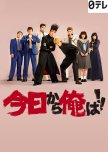
Kyou Kara Ore wa!!
8 oamenii au considerat această recenzie utilă
First of all, just want to be clear that I like this drama, but not to the point calling it masterpiece. Very far from being the funniest drama I have ever seen too.
To me the attraction of this drama lies in the retrospective time-frame the event took place. That's to be expected from a 90's manga's remake! Just love the fashions, hairstyle, makeup and even some terms that no longer being used in drama like "Tsuppari". Credit to production team for making such a retro drama. It would have been a lot easier to make historical than a retro in my opinion, because it's easy to messed up with the technological fact i.e phone, computer, etc.
As far as the comedy drama concern, I have a mixed feeling. First, the "anime-like-episodic" approach is cool IMO. The slapstick comedy was overdone in some, but still acceptable and entertaining. What I'm not a fan of was that kind of moment when you already get the joke, but they keep over-explaining it (not necessarily lingual) until it feels not funny anymore. I noticed this same style was also in Mr. Nietzsche, which I lose interest after episode 1. However, the adlib and mumbling from Sato Jiro was excellent to be fair.
For acting, don't watch this drama if you're not a fan of Kaku Kento's MJ-like moves. Hahaha... Thanks to that, I feel Taiga was less overacting, if you know what I mean.
The other good thing about this drama is it's full of fighting scene and action. This alone made up for the so-so comedy and the hyperactive Kaku Kento.
All in all, good drama but definitely not that funny (at least to me). This is however highly recommended if you're:
1. Looking for inspiration of 80's fashion
2. Love high school drama
3. Want to see fight scene in every episode
Considerați utilă această recenzie?
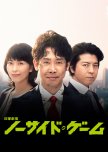
Această recenzie poate conține spoilere
Now tell me how many series/dramas/movies/shows out there are about rugby?No Side Game is a special novel based drama dedicated for the currently happening (at the time of writing this review) World Cup Rugby 2019 in Japan. It's a great event that is organized for the first time by a country that isn't considered as powerhouse in this sport.
Unlike the usual sport's theme drama, No Side Game is local-targeted and try to convey several key messages, or should I say this is a drama with mission? One is to create awareness to the Japanese society who would otherwise prefer other sports like football (soccer) or baseball. The difficulty to attract crowd to the stadium (even with free ticket) is one of the things discussed by the writer, as well as the parents concern towards their children's safety if they were to allow them play rugby.
Secondly, it depicts the harsh reality of Japanese rugby system. You will be surprised to know that the official main rugby league in Japan is semi-professional, where the athletes have to do day-job alongside playing rugby. The teams who participate in this semi-pro league are the companies that need to take care of their profit/loss than to waste money over something unprofitable such as sport. The situations dramatized in this series might be more closer to reality than what you could imagine!
The drama also tells how the conventional way of thinking by certain people at top of rugby association would not benefit Japanese rugby in the long run. The reliance to politician makes the association much more harder to be revolutionized. But somehow the changes need to be done especially in boosting league's income and then could be distributed fairly among participating teams.
Drama-wise, No Side Game is a bit less intriguing than few other Ikeido Jun's business dramas, but the warmness of the protagonist's family especially the portrayal of wife character by Matsu Takako is what makes this an enjoyable show. Other actors also did the job well if not amazing. First few episodes are okay but the drama really picks up after episode 5 when more business politic plots got involved in the story.
If this is not for World Cup Rugby, I would just rate it an 8. But I add 0.5 more for the effort Japan put in giving publicity to this event and so far I see the stadium attendance for all matches are full house! Good job Japan!
Considerați utilă această recenzie?
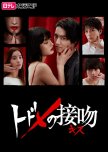
This was never on my PTW list. It's just that seeing it got through to the final listing of MDL best Jdrama 2018 award, made me a bit curious about it and so here I am writing a review for the first time ever. I'm sorry if by any means my writing hurts anyone who loves this drama feeling.
The overall story is cliche. I mean we have seen this back in time to correct mistakes plot over and over aren't we? The only saviour for this type of plot is when you have a heartwarming story alongside it. Normally family/relationship related stuff is used by the screenwriter. Think JIN, Ryuusei Wagon, Suteki na Sen Taxi, ProDai.
Similar for Todome no Kiss, but the "alongside" story was kind of half-ass IMO. At the beginning, it appeared as a revenge plot in disguised by "desire to become rich" of the ML. While everyone who's watching the drama knows how the characters are related to each other, and could roughly predict on it's direction, the screenwriter made a plot twist (not making sense one) by making the ML clueless about it until half way of the series. Even so, he did not seem like taking revenge after knowing the truth and chose to become rich instead.
There was also plot hole in the writing, for example a major time-travel inconsistency on episode 3. Apart from that the characterization of the ML doesn't written properly too. At times he was portrayed as someone who's smart and sly (and because of that the screenwriter need to remind the viewer by making each female character to say KUZU in each episode), and at some other time he looks much stupid than elementary school student.
The cinematography was nothing spectacular as well. It's as good as you could see in other standard Japanese dramas out there.
However, there are also few good things to mention. Especially Suda Masaki's acting throughout the drama. He has small role and few screen time, but leaves a greater impact with his warm presence. Other than that, the last episode was good IMO even without having to watch episode 10 of "Parallel" (which I also watched BTW).
Considerați utilă această recenzie?
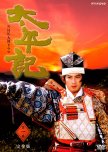
If you love Japanese history or culture or both, Taiheiki is a must watch!! It revolved around the time of transitions between three important ancient government systems, namely Kamakura Shogunate, Kenmu Restoration, and the early Ashikaga Shogunate (when there were 2 Emperors in 1 nation).
I never read Yoshikawa's novel or the classic scripts, so I don't know how close the drama is. But in my opinion, the writer did a good job in portraying several aspects of this turbulent era in Japanese history.
One of the aspects is social sentiment, which is how one social class is viewed by the other and sub-sentiment between the same social class. This aspect has been nicely written and would give viewers a sensible explanation on why these 3 political transitions happened in Japanese history.
Another thing that was nicely portrayed is the cultural aspect of the 13th and 14th centuries. If you're used to Jidaigeki's dramas that mostly focused on Sengoku to pre-Meiji eras, this is an opportunity to see the new things.
The obvious one is "Samurai Sword", which is more shorter and slender than the one we know. The building's interior is more open space than the well known compartmental room style. You would also be surprised to see less sliding doors, less tatami mats and even to see windows in the building!! There's also transition in the dance style that would later evolve into "Noh", as well as flower arrangement that is slightly different than the modern one.
Apart from that, Taiheiki was also amazing in terms of characterization as it was based on real life characters. The relationship between Takauji and his brother, as well as his family and people around him was nicely done by the production team thanks to the amazing acting by Sanada Hiroyuki, Takashima Masanobu, Jinnai Takanori, and Emoto Akira among others.
The only downside is that the political systems were not discussed in detail enough, especially the differences between Kamakura system with the new Ashikaga system. The impact on having dual courts (Northern and Southern) was also less discussed due to more focus on Ashikaga's internal conflicts. Some of the wars, especially during few last episodes were only explained through the narration instead of having scenes for them.
Considerați utilă această recenzie?

Această recenzie poate conține spoilere
Tokyo Overrated Vice!
Reading some reviews on IMDB makes me wonder am I watching the same show...LoLI think this series is way too overrated. I had to wait until ep4 to really get into it. The first 3 episodes were boring as hell, with no significant plot development. It felt like they were mostly fillers of random disjointed things being put together. The real story only started at ep4. It was the turning point for me. We have the "I want it that way" joke as well as Kawakami Nanami fanservice in this episode....haha otherwise I could have probably dropped this.
Apart from that, the major letdown of this series in my opinion is its protagonist. The premise of the show is a white guy who got a job at Japanese newspaper. The main story should be about him, but this character wasn't getting major involvement in the series. Most of the events happened without him around. Throughout the series he was shown as someone who's barely working, wasting money on Kabakura, impatient and clumsy, but acted like some big shot and quite rude considering he's living in Japanese culture. Ironically and luckily , the side characters and the side plots were the one that saved the series for me.
They were also some unrealistic, illogical, and contradicting things in this series as well. One of these is the fact that the real Jake Adelstein only do "the exposure" after some time he worked in Japan. In the series however, the protagonist got involved with Yakuza from day 1 he joined the company. It wasn't clear what motivated him to do that though ..,which makes thing illogical and laughable. After some time in the series, for some strange reason his superior (Kikuchi RInko) had to listen to his whatever selfish request....There are many others but I don't want to write a thesis.
On the positive side however, we can see some real talent from Japanese actors like Kasamatsu Sho, Ito Ayumi (Tozawa's mistress) and Yamada Jundai (fixer who's eyeing on Samantha). Most people only focusing on Watanabe Ken, Kikuchi Rinko and Ito Hideaki, so they tend to overlooked at the actors I mentioned above. It's also worth mentioning that Yamada Jundai's English was the best among all Japanese actors in this series. I wish he will get more international job offer in the future.
The production value of this series was as good as what you could get from an American production. The music was okay but nothing great to talk about.
In summary, I don't say this series is bad...it's watchable (although not bingeable for me). But definitely it wasn't that groundbreaking as what some people on IMDB might have claimed it was.
Considerați utilă această recenzie?
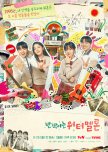
Sparkling Watermelon
5 oamenii au considerat această recenzie utilă
Această recenzie poate conține spoilere
Too Many Flaws To Overlook
Before started watching I have the feeling that this drama is overrated, but I wanted to give it a chance because of the premise. Unfortunately, Twinkling Watermelon was not up to the expectation thanks to several issues that I will explain later.Overall, this drama was a mix of "good visual, make-believe, cute moments" with "draggy, non important, filler moments".
With the long duration of each episode (to me 1 hour is long LOL), people tend to remember the former more than the latter, creating a wrong perception that it was a decent drama while it's actually not. Perhaps this drama could only be considered good after we remove all the unnecessary? Or maybe it will be good if the following issues can be handled better by the production team, and then only we can overlook the filler moments;
1. Failed to focus on small details
-------------------------------------------
This is the major issue in this drama. The writer was lazy to take care of the small details resulting in many afterthoughts writing "cover up". There were also some questionable illogical actions from the characters that felt unnatural throughout the drama. The representation of deaf people was more on the superficially dramatic side instead of the believable one.
2. Non consistency in main character
-------------------------------------------
The main character, Eun Gyeol sometimes was portrayed as smart, responsible, and genius. But at other times he was portrayed as plain stupid. Because of that we had to deal with unnecessarily TIRING misunderstanding between him and his teenage father, Yi Chan for like half of the duration of the drama in each episode. I understand the writer wanted to create the so called cute moments and pseudo bromance but it felt repetitive and too forceful (and tiring). His slow ability to read the clues left by Eun Yu was another example of his character stupidity, where the writer used this to drag out the plot to the max.
3. Disappointing music/band element
-------------------------------------------
The other major disappointment in Twinkling Watermelon is its music direction. Some may say this is not the main focus of the drama. But please remember that the whole thing start and end because of music. From the young Eun Gyeol learning the guitar until he joined SPINE9.
Firstly, they superficially made Eun Gyeol as the genius guitarist. However it wasn't clear what was his style of playing and what kind of music genre he was into. Showing some random guitar techniques and Canon Rock did not help.
Secondly, the whole band-forming arc in the 90's was a JOKE! They confused making a band with making a sport team, where you need to find the most powerful player...LOL. It would have been great if they could show what kind of music Yi Chan listened to, rather than randomly picked Nirvana but didn't show anything close to that genre/sound in the end.
Thirdly, the choices of music, sound, and styling for the band was not ROCK enough for a band that's formed in the 90's. Similarly the background music selection did not vibe the 90's. Considering good budget the Korean have for their drama it won't hurt paying royalty to appropriate western songs if needed.
Finally, the band members were shown as doing all sort of things except playing music. It was not until Ep10 that we see them play and practice together. Even so it was like magic that everyone could blend in so quickly and able to play like professional backup musician at one try.
4. Pseudo 90's portrayal
-------------------------------------------
I guess 90's era is one of the selling point of the drama but the writer and production failed to utilize it. I didn't get the nostalgic feeling even though I was there (not in Korea though LOL). Nothing portrayed in the drama was really a fair representation of the era except for maybe some posters and vinyl album covers at random places. The technology limitation did not play an important role to the plot at all. Instead, the writer chose to overuse PAGER as one size fits all solution for the writing, which is a bummer since it was not a must have device unlike smartphone of today.
5. Pacing
-------------------------------------------
Most people found this drama boring during the beginning right up to Ep4 before it turned into better. For me, Ep1 was okay but it started become draggy and overstretch right after that. Only the last 6 episodes were showing some progress, with the following breakdown:
Ep11 - Ep12: They show more of the band and its members in action
Ep13 - Ep14: They show more of the romance
Ep15 - Ep16: They show MC solve the mission and conclusion
Even though many found the ending rushed, I personally liked it because they didn't explain everything and left it for interpretation. It was an ideal ending for this kind of drama IMO, albeit typical and predictable. Or maybe I just wanted to finish the drama quickly IDK...LOL
Considerați utilă această recenzie?
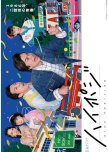
The comedy however was light and not enough to make you ROFL, but the situations presented will make you smile throughout the series. I found the last 4 episodes were the most engaging and I liked at how it was wrapped in final episode.
High Position also has lots of 80's reference, from fashion, pop-culture, technology and lifestyle. Therefore someone who have lived during this time may find it kind of nostalgic too.
Considerați utilă această recenzie?
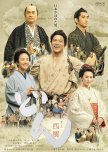
Această recenzie poate conține spoilere
This is my first Taiga Drama from the late Edo period, and as a bonus this is also span through the early Meiji era. Maybe because of its closeness with modern time, Segodon is easily relatable to the current world. I would say, this is simply a must watch!In summary, Segodon is a heartwarming drama with strong values of friendship, families, ideals, and dreams. At the beginning of the drama, there was a narration something like; "Saigo Takamori, a person who was popular with men and women". And at the end of final episode, that is exactly what viewers will feel. Credit to the production team for managing to convey this message despite the drama being aired for a year long.
That said, one strong point of Segodon that I think is worth to mention is its casting. I must say they have a good casting team. Even Suzuki was willing to gain weight for his role. What an amazing actor he is! The overall acting from the rest of the actors was excellent too with many scenes managed to caught my emotion (not necessarily the soapy one).
Being an historical drama made the dialogs more interesting, with deep meaning in their conversations. They did a good job too on the Satsuma accent as well as the islander dialects, but I'm not Japanese so can't really tell if they made blunders in between.
Another thing that I found interesting in Segodon is how they use hints when it involves (immoral) man-woman relationship. This might be a spoiler, but for the sake of giving example there was a scene with Ooyama saying, "from now on Otama (escort lady in Edo) and me are one". There's also other scene when Okubo receive medicine from Oyuu and said thanks in Kyoto dialect "o-kini" while Saigo and the other guy keep looking at each other. Both scenes ended abruptly without much explanation but surely hinting on something (at least true for Okubo's case).
It's also suspicious when Saigo named his son Torataro and at the same time there's woman called Tora who worked in Satsuma's Inn in Kyoto who portrayed as taking interest on Saigo more than usual (however more like a one-sided love). But, viewers know the reason behind Ito's divorced before she married Saigo.....so this is the big mystery among all.
Despite all the good things, there are also few week points of this drama especially on the story towards the end. I personally think the screenwriter should have elaborated more on some of the important political events such as the Boshin War and conflict between Kido and Okubo (which was missing from the storyline).
Another thing I noticed is the interpretation of Okubo's character during the several last episodes. This is just me but it feels like the production team was too cautious about it by leaving viewers to interpret themselves. A lot of scenes related to Okubo's action were done so vaguely. It would be great if they just be bold on that matter, just like how people made interpretation of Tokugawa Ieyasu for example.
Considerați utilă această recenzie?
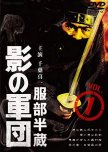
Hattori Hanzo: Kage no Gundan
2 oamenii au considerat această recenzie utilă
The downside of this drama however, it was in episodic format with 1 case per episode (some span up to 2 eps) kind of TV show. The main story was not so connected from episode to episode so you can skip one or two without missing anything. Some editing wasn't done correctly that the story flow of some episodes felt strange and jumpy. I guess it was shot on film so it was hard (and costly) to retake once they already in the editing stage...but I could be wrong as I don't know shit about movie making.
Overall still highly recommended if you're looking for kick ass Ninja drama with lots of action...but don't expect character development what so ever as the focus was on the martial art which I think worth to check out. Considering this was produced in the 80's, I gave it 8/10!
Considerați utilă această recenzie?
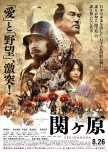
Această recenzie poate conține spoilere
Well, this is such a disappointment! The movie looks like a "big budget" production, but I don't think non-Japanese could easily appreciate considering this is not a "festival" kind of movie and Sekigahara Battle itself is already hard to comprehend with involvement of many warlords throughout Japan.Firstly, the dialogs are damn fast. The characters talk like there's no tomorrow, one line after another. To make it worst, those lines contain important facts to the story flow.
I don't know about native English speaker, but my brain had to work double throughout the movie. First to understand the English subtitle, second to recall the facts of this largest battle in Japan (that I learned elsewhere) because the movie failed to explain it well enough with a lot of "scenes skipping" one after another. The narration could be done much better, otherwise it's indistinguishable from the actors lines.
Secondly, the interpretation of Ishida Mitsunari's action was not that logical. It feels like the character had already read history book in certain part. For example, he can predict what's going to happen with Kobayakawa but still giving him such a big role in the battle.
The movie was also trying to portray the other side of Mitsunari with his concern towards Princess Koma and after that her attendant (Arimura's character), but it feels more like a sugar coating than an interpretation.
Lastly, while Ishida Mitsunari is the main hero here and the movie feels like trying to give justice to him, it's damn strange not to include his family (wife and children) but more focusing on Arimura's character as love interest. Other than that, Lady Yodo (Chacha) also has no dialogs in this.
Overall, this unintentionally feels like a wannabe film despite the good acting and nicely done cinematography. The inclusion of "Er Hu" solo section in the orchestra used for background music is also questionable! (lol before watching I saw someone commented on the other "streaming site" questioning why use Chinese music for Japanese movie, so when I heard the Er Hu part I was like ROFL)
Considerați utilă această recenzie?
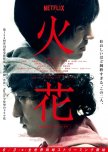
Spark AKA Hibana is a slow paced, slice-of-life drama. It's a real depiction of life, not just by simply having a realistic plot. The main characters are well written thanks to the award winning novel. They are non stereotypical kind you would normally see in books, films or TVs. The way they think and decide on things are more similar to us, normal people. Sometimes in life we meet someone new (or new opportunity), but not necessarily anything would happen from that encounter. People come and go in real life and sometimes you won't meet them ever again. That's what the drama was trying to convey.
The direction and acting for this drama were amazing in my opinion. There were a lot of scenes with mixed and complex emotions throughout the series, but the actors really did a great job especially Namioka with the most complex role among others. Hayashi did well too, but he's got his usual kind of character although with an additional personality (when he''s doing manzai comedy).
It is also rare to see any Japanese drama to be as high production value as Spark. You will have the "watching movie" experience throughout the series with lots of non-usual camera works that anyone wouldn't bother to use in a (J) drama. For example, there are several scenes that were shot from a long range where the actors just doing their (crazy) stuffs in the middle of public as well as some shots with additional stories that are not related directly to the plot but at the same time give more meaning to the plot.
All in all, Spark is amazing drama with full positive message of friendship and humanity apart from telling the realistic story of chasing dreams. The only downside is the really bad misleading poster as well as the last few minutes on the last episode as others have mentioned (the reason why I rated its rewatching value lower) . However, it's still worth to watch the whole series and highly recommended for slice-of-life lover or to anyone who would be looking for something different!
Considerați utilă această recenzie?
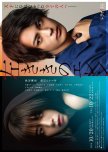
Hidarikiki no Eren
3 oamenii au considerat această recenzie utilă
Această recenzie poate conține spoilere
Overall, this is an okay drama targeting younger audience with up-to-date production style featuring pretty faces as the main casts ... The story has essence in it as it is based on a real-life art directer written web manga, but somehow the script plus execution of the drama was not enough to make me feel inspired... It's closed but not there yet!!Firstly, the good things:
1. Nice production style plus pretty faces
2. Quite well in explaining how a creative department in advertisement company is operated, as well as the people around it
3. Tried to showcase different views in carrier's goal as well as different characters of people when doing work and the stories behinds it...somehow this part remind me a bit of Juuhan Shuttai
4. I love the OP and ED songs
However, the bad things are:
1. BAD ARTWORK, BAD ARTWORK, BAD ARTWORK!!! Despite the drama is about ART, the featured artworks are mostly mediocre....this is one major drawback of this drama and it keeps bothering me to be honest...LoL
2. Acting-wise, the actors have less screen time in doing their arts. Those from the school days are not clearly shown. The recent days projects are barely shown on how they actually doing it... We never even have chance to see Eren do a decent painting....and the way she hold brushes unconvincing as hell...
3. Not only we don't see Eren do decent painting, we don't even see any masterpieces that make her deserved to be called genius...LoL
4. During the first encounter of Koichi and Eren, Koichi inspired by Eren's "graffiti" and called her genius....where did he get that from?? The art featured in the drama was not even closed to graffiti let alone genius...Yes I've seen the one used in manga, which is million times better
5. The ending has potential to come strong, but it was a meh...
Considerați utilă această recenzie?
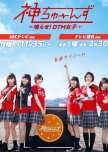
Kami Tunes - Narase! DTM Joshi
1 oamenii au considerat această recenzie utilă
More JK Less Music
The premise of this drama is: "everyone can make music even if you're not professional as long as you have the originality and energy". This is referring to the usage of Apple GarageBand apps and the protagonist was portrayed as someone who's striving to create "Godly Song". She was inspired by Kawatani Enon (Indigo la End, Gesu no Kiwami Otome et al) who made a cameo in the drama.Now the problem:
1. The drama didn't focus much on the music making process. Our protagonist can make a song on a whim (even when she can't play instrument) without much inspiration and brainstorming let alone the technical understanding.
2. However, the focus of the drama was more on forming a music group instead, and in this case a Jpop-Idol-like music group. Half of the series was about getting members to join. They eventually formed a school's club. They were also too concentrated on the performing aspect of their group rather than their music direction. Although most of them suck at dancing and singing.
3. The writer tried to make up the drama with the guitar girl character by throwing some technical jargon here and there in the script. Although their music wasn't guitar oriented at all and "guitar part" was very insignificant. The writer also randomly included Jpop artists name as reference in the script, just to make believe her drama is legit.
4. Not sure if the writer is an Apple "fanboi", but the drama felt like one with all the devices featured as well as the iMusic festival being mentioned in the drama. There were also plenty of Steve Jobs quotes in the script.
All in all, this is a typical JK (Joshi Kousei or High School Girls) drama about school's club and the relationship among members of the club. The usage of the term, DTM (desk top music) in the title was most probably an Apple thing and has no real impact on the main plot of this drama. What a click-bait!
Considerați utilă această recenzie?


 1
1 1
1






















